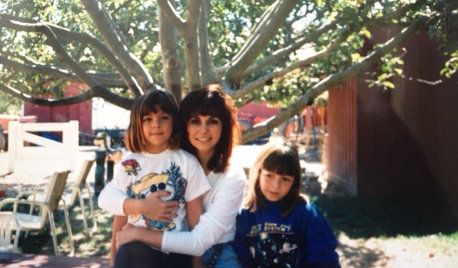Autodidactism vs What We Were Taught at School
friedag
14 years ago
Related Stories

COFFEE WITH AN ARCHITECTWhat My Kids Have Taught Me About Working From Home
Candy and Legos aren't the only things certain small people have brought to my architecture business
Full Story
LIFEHouzz Call: What Has Mom Taught You About Making a Home?
Whether your mother taught you to cook and clean or how to order takeout and let messes be, we'd like to hear about it
Full Story
LIFEDesign Lessons My Mother Taught Me
In honor of Mother’s Day, professionals on Houzz reflect on the design and style wisdom their mothers passed on
Full Story
FALL GARDENINGWhat Monarch Butterflies Taught Me About Garden Design
Thinking like a butterfly leads to fresh perspectives in the garden and in life
Full Story
KITCHEN STORAGEEnd the School-Lunch-Prep Chaos
Make mornings less hectic with kitchen drawers and baskets dedicated to kids' lunch boxes and accessories
Full Story
GARDENING AND LANDSCAPINGOld School Green Design: Add Texture With Grass
Ornamental grasses capture the breeze and ripple like water in the landscape
Full Story
LANDSCAPE DESIGNBorrow From the Bauhaus for a Modernist Landscape Design
Dig into three principles of the influential German school to integrate your home and garden and have a beautifully functional design
Full Story
ARCHITECTURE3 Surprising Essential Tools for the Modern Architect
If your architect doesn't work with these, you might want to steer clear. And nope, we're not talking about CAD
Full Story
ENTERTAININGA Place for Everything: Beautiful Ways to Style Your Table
Polish your silver and pull out your china as we look at how tables were laid out traditionally and how they shine now
Full Story
MOST POPULARThe Most Popular Kitchen Storage Ideas of 2014
Of all the kitchen storage photos uploaded to Houzz this year, these 14 were tops. Which will you save to your kitchen ideabook?
Full Story


woodnymph2_gw
merryworld
Related Discussions
What 'Non-Girl' or 'Non-Guy' Lesson were you taught?
Q
school house light - inexpensive vs expensive
Q
Sylvan vs. Home Schooling
Q
School lunches vs lunches made at home?
Q
twobigdogs
twobigdogs
sheriz6
J C
Ideefixe
Kath
friedagOriginal Author
woodnymph2_gw
merryworld
friedagOriginal Author
dido1
veer
friedagOriginal Author
carolyn_ky
J C
friedagOriginal Author
rambo
Kath
veer
Kath
friedagOriginal Author
sheriz6
Kath
woodnymph2_gw
twobigdogs
carolyn_ky
woodnymph2_gw
friedagOriginal Author
friedagOriginal Author
carolyn_ky
woodnymph2_gw
friedagOriginal Author
Chris_in_the_Valley
elliottb
friedagOriginal Author
woodnymph2_gw
lemonhead101
elliottb
friedagOriginal Author
twobigdogs
lemonhead101
elliottb
friedagOriginal Author
woodnymph2_gw
friedagOriginal Author
veer
twobigdogs
friedagOriginal Author